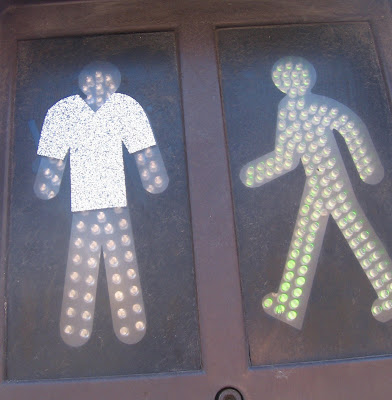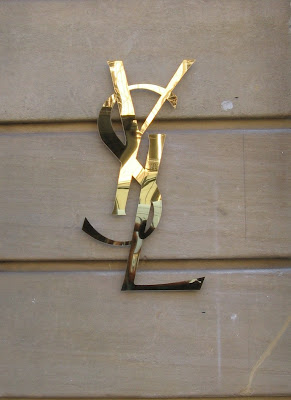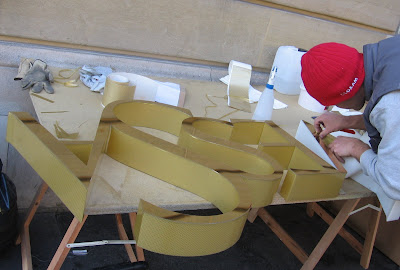It happened again. This afternoon. In a café on avenue Bosquet, when paying the waiter for my coffee.
In this case, there was a funny misunderstanding about the change he was giving me, and I was trying to explain my confusion about it, in a jovial but somewhat flustered French. The waiter realized that I was not French, although I was speaking to him fluently
en français. He then counted out my change and said, "
Muchas gracias....Sankyoovarymoch, ahve eh nice deh," and plunked the remaining euros on the table.
Grrrr.The last time this happened, it made my blood boil. I was waiting for a friend in a café on the place de la Madeleine. I ordered, "
un Coca Light, s'il vous plaît." That's all I said. When I asked for "
l'addition, s'il vous plaît" about 20 minutes later, the waiter said in in fifth-grade English, "Fi-eeve euhros, pleess," with a smug grin and all five fingers up, just in case I didn't understand. I was infuriated. I was fuming. I had spoken to him in very intelligible French. Who cares if he could tell from looking at me (in my French apparel, no less) that I wasn't a native? I had sat there, reading a French book, not being an 'ugly American' in the slightest. But somehow he decided that it was his prerogative to assume that I was an American and thus needed to be addressed in English.
But rather than get angry at him, which would have been pointless, I decided to make up a little script of French snappy comeback lines for waiters the next time this happened. Because it does happen.
Ooh, revenge in the imagination is sweet. My lines, in French, were coolly-sprouted phrases such as, "Excuse me. Am I dreaming, or did I order in French?" and, "Oh, since you are speaking to me in American, shall I pay you in dollars?"
heh-heh.I'd been practicing a number of these lines in the privacy of my own
appartement, to save in the handy repertoire,
au cas où. Fortunately I have not needed to deploy them with café waiters since that episode months ago at la Madeleine. Until today.
Damn. Timing wasn't right for using my perfected Polly-Vous-Français zingers on the café server today, and I was frustrated to feel that that he could have the upper hand in the transaction. All sorts of "why torture the Americans?" thoughts were racing through my mind.
But, then I heard him serving a French couple a few tables away from me. The older woman wanted to pay for the bill for herself and the thirty-something guy with her. Monsieur 30Something said, "
Non, non, let me pay," but his female friend persisted. "
Non, non, j'insiste." The woman paid.
"
Gigolo!" snorted the waiter to the guy.
I cracked up, inwardly and quietly,
bien sûr. Hmm. All things considered, I guess I prefer "
Sankyoovarymoch," and will henceforth probably keep my trap ...shut. Maybe.
Or, who knows? On the other hand, I may return to that café, where I otherwise soaked up the cool ambiance, and try to out-do the waiter by speaking to him in well-rehearsed French. He's either a jerk or really funny, and I'll never know unless I go back.
This is Paris. I can't explain it. Ultimately, something about that half hour in the cold sun on avenue Bosquet made me adore Paris even more.
 For anyone who hasn't seen enough reasons to come to Paris, here's one more: American Airlines' "Milestones" online guide to Paris for frequent fliers. Complete with requisite tourist accordion music, it is homespun-funny, and has some good pointers for getting along as an "American in Paris."
For anyone who hasn't seen enough reasons to come to Paris, here's one more: American Airlines' "Milestones" online guide to Paris for frequent fliers. Complete with requisite tourist accordion music, it is homespun-funny, and has some good pointers for getting along as an "American in Paris."


















































